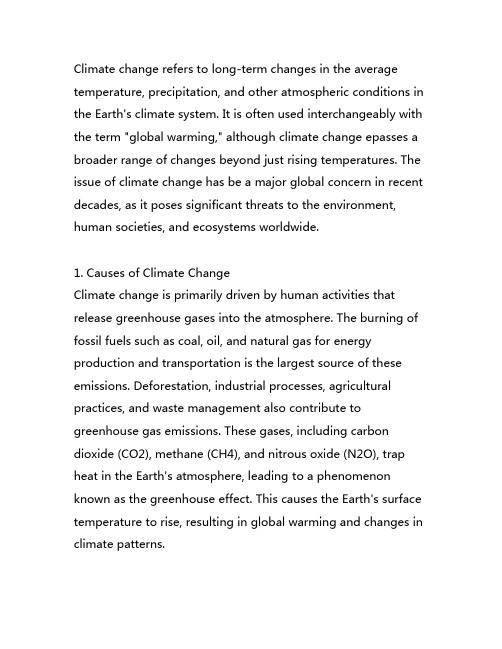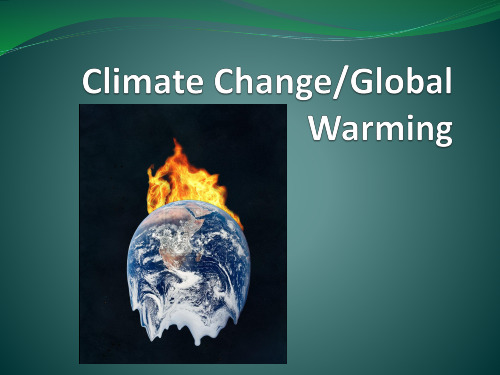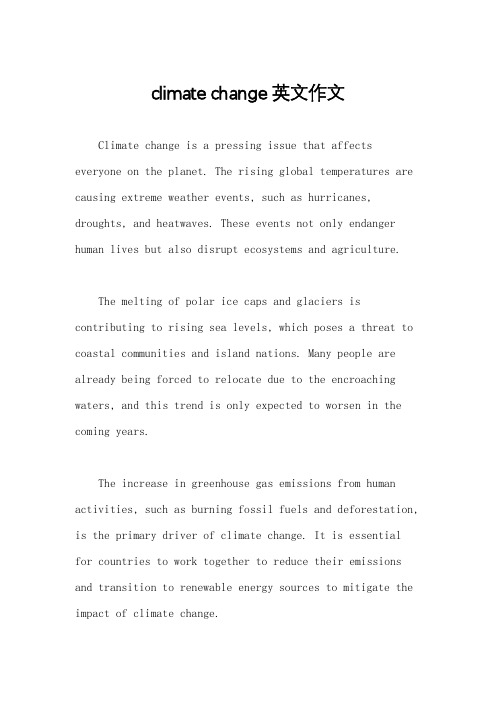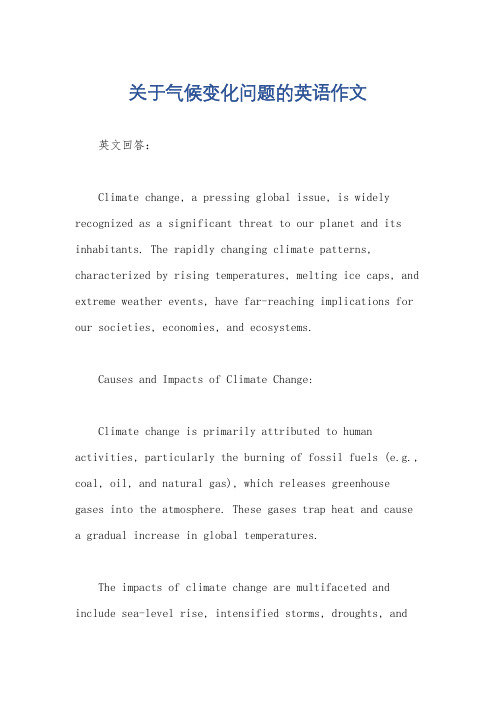Climate Change
气候变化 Climate Change 英语作文

Climate Change>Essay on climate change:Climate change, which is brought about by urbanization, is a grave issue that we are dealing with. Climate change is an issue that we all are worried about and whose impact is felt by all of us. It is still an unknown fact to the scientists whether this climate change is the sole reason that is causing global warming or not. It is even a tricky job to separate climate change from global warming because it is an intertwined subject. Climate change should be brought under control as soon as possible.We have compiled some long and short essays for the use of the readers. and many moreLong and Short Essay on Climate Change for Students and Kids in EnglishGiven below is an extended essay of approximately 400-500 words and is for the students of standards 7, 8, 9, and 10 and a short piece of nearly 100-150 words for the students of standard 1, 2, 3, 4, 5, and 6.Long Essay on Climate Change in English 500 wordsThe definition of climate states that the word “climate’ is used to refer to long term periodic variations in the weather patterns that are observed over centuries. Ever since the Earth was created, it is going through many changes simultaneously, and this leads to climate change. Climate change happens cyclically, it had started from a colder ice age, and at the very present, it is much warmer than it was two million years ago. All these millions of life forms we see today on Earth is because of the non-stop energy received from the Sun, which is the ultimate source of energy, which is continuously fuelling the weather system.To jot down a few notable changes, the world is experiencing arbitrary droughts, unexpected weather patterns and sudden rainfall and snowfall, there is a constant fluctuation in the temperatures leading to disasters like a forest fire, and the weather is no longer predictable enough. The changes are random, and it is getting stressful day by day even to keep track of the changes occurring. These changes have drastically influenced human lives in both positive and negative ways.global warming essaysEver since evolution has taken place, humans are continually using nature for their benefits. This has resulted in Some of these are –huge carbon dioxide content in the environment and other harmful materials in the atmosphere and water, the regular use of the fossil fuels has led to the complete exhaustion of it. The constant exploitation of natural resources and not taking any significant steps to make the situation better and ultimately resulted in the accumulation of harmful gases in the environment. The ozone layer depletion caused by greenhouse gases is also due to climate change.These changes that we have caused to the ecosystem are not reversible. The only thing we can do is try to make the biosphere a better place to live in. Because in the upcoming days it is predicted that the Earth’s temperature will rise day by day leading to the extinction of life and this is because of the increasing amount of greenhouse gases being released in the atmosphere. The greenhouse gases trap in the heat which is supposed to be emitted.Short Essay on Climate Change in English 150 wordsToday one of the hottest topics around the globe is “Climate Change” which is threatening our life on Earth. Climate change refers to the adverse change in the environment and its impacts on the living organisms on Earth. The climate of Earth has become warmer over the last two million years for which, climate change and global warming is responsible. The absurd increase in the atmospheric temperature leads to various drastic changes in the Earth, for example, season shift. Deforestation, the burning of fossil fuels, and other human activities are the most important reasons forglobal warming, which causes a variation in the climate.Forest fire, intense rainfall, melting of the glaciers are so the horrific climate changes brought around by global warming. We need to prevent global warming to live a peaceful and happy life. Afforestation should be practised, and the exploitation of the existing natural resources must be immediately cut down. Climate change and global warming are some severe issues that demand attention so that Earth can heal.10 Lines on Climate Change Essay 150 wordsClimate change is a miserable threatening to all living forms on Earth.The usual definition of the word climate has lost its meaning because the environment has become unpredictable. One cannot figure out when the weather is going to change.The leading causes of climate changes are overusing of fossil fuels, deforestation, and exploitation of all other natural resources.The results of climate change are not very soothing; it consists of increased temperature,melting of glaciers, intense rainfall and frequent forest fires.The rate at which the Earth’s temperature is increasing is alarming, and if this continues, the Earth’s temperature will rise by 1 degree Celsius to 5 degree Celsius in the next decade.Climate change and global warming are adversely affecting agriculture.Greenhouse gases play a significant role in climate change.Day by day, the ozone layer is getting depleted.We soon have to start using sustainable resources of energy as the natural resources are almost extinct.If global warming and climate change are not brought under control, the end is near.Frequently Asked Questions on Climate Change EssayQuestion 1. What is precisely meant by the term Global warming?Answer:Global warming refers to the average increase in Earth’s temperature. It is caused due to greenhouse gases which mainly consists of methane, carbon dioxide, CFC’s or Chloro Fluro Carbons, etc.Question 2. Is climate change interchangeable with global warming?Answer:The words “climate change” and “global warming” are easily interchangeable, but the term climate change includes global warmingand its adverse effect on humankind and the living world.Question 3. What are the outcomes of global warming?Answer:The effects of global warming are disturbing. Due to excessive urbanization, the Earth’s temperature is regularly increasing, and glaciers are melting in the poles. If global warming is not controlled, eventually, the existing life forms on Earth will end soon.。
气候变化词汇

气候变化climate change减缓和适应气候变化to mitigate and adapt to climate change全球变暖global warming脆弱性评估vulnerability assessment累积碳排放cumulative carbon emissions世界的主要碳排放国the world's major carbon-emitting nations排放大国major emitters人均碳排放最多的国家the biggest carbon emitter per person减排要求emissions-cutting requirements气候变化的不确定性the uncertainty surrounding climate change高碳行业carbon-intensive industries高碳能演carbon-intensive energy sources 碳汇carbon sink 定义1:一个碳贮库,它接收来自其他碳贮库的碳,因此贮量随时间增定义2:有机碳吸收超出释放的系统或区域。
如大气、海洋等碳库Carbon reservoir在碳循环过程中,地球系统各个所存储碳的部分Carbon footprint 碳足迹“碳足迹”来源于一个英语单词“CarbonFootprint”,是指一个人的能源意识和行为对自然界产生的影响,简单的讲就是指个人或企业“碳耗用量”。
同时他还是由企业机构、活动、产品或个人引起的温室气体排放的集合。
CCS 碳捕获和储存[包括捕集运输和封存] carbon capture碳捕获低碳技术low-carbon technology无碳能源carbon-free energy汽车碳排放automotive carbon emissions零排放电力来源zero-emission power sources森林碳汇forest carbon sink推卸其应该履行的对发展中国家的义务to shirk responsibilities thatshould be assumed towards developing countries永久冻土层正在融化the permafrost is melting冰川glacier冰河世纪the Ice Age冰盖ice sheet冰帽ice cap冰核ice core六氟化硫sulphur hexafluride绝对减排量absolute cuts in emissions极地冰帽融化提高海平面melting polar ice caps raise ocean levels碳减排项目carbon-abatement projects哥本哈根气候变化峰会the Copenhagen Summit on Climate Change非碳能源non-carbon energy sources鉴于气候的复杂性given the climate's complexity可测量、可报告、可核实measurable, reportable and verifiable 三可MRV有约束力的量化指标binding quantitative targets额外性additionality海冰融化melting sea ice北极冻原the Arctic tundra温室气体排放的最大来源是发电the biggest source of greenhouse-gas emissions is electricity generation减少发电的排放to cut emissions from electricity production气候灾难 a climate disaster吸热气体heat-trapping gases甲烷methane毁林占全球排放的20% deforestation accounts for 20% of global emissions单位GDP的排放量emissions per unit of GDP确定碳强度的指标to set a carbon intensity target碳强度carbon intensity碳强度是指单位GDP的二氧化碳排放量清洁发展机制the Clean Development Mechanism (CDM)历史排放historic emissions当前排放current emissions全球碳排放global carbon emissions巴厘路线图the Bali Roadmap作为2007年联合国气候大会最重要的决议,“巴厘路线图”(Bali Roadmap)确定了世界各国今后加强落实《联合国气候变化框架公约《京都议定书》的后续协议 a successor to the Kyoto Protocol缔约方COP[conference of parties]1993年《联合国气候变化框架公约》the 1993 UN Framework Convention on Climate Change (UNFCCC)联合国政府间气候变化专门委员会the UN's Intergovernmental Panel on Climate Change (IPCC)泥炭地peat lands化石燃料的燃烧释放温室气体the burning of fossil fuels releases greenhouse gases国际气候变化谈判international climate change negotiations将二氧化碳深埋地下to bury carbon dioxide deep underground实现经济的去碳化to decarbonise the economy一氧化二碳nitrous oxide一个原则 common but differentiated responsibilities共同但有区别的原则一个机构IPCC[Iintergovernmental panel on climate change] 政府间气候变化小组两个协议Kyotol Protocol京都议定书UNCFCC[united Nations Framework on climate change]联合国气候变化框架条约两大方法mitigation and adaptation三大机制carbon pricing碳标价emission trading CDM[clean development mechanism]清洁发展机制。
climate change 英文释义

Climate change refers to long-term changes in the average temperature, precipitation, and other atmospheric conditions in the Earth's climate system. It is often used interchangeably with the term "global warming," although climate change epasses a broader range of changes beyond just rising temperatures. The issue of climate change has be a major global concern in recent decades, as it poses significant threats to the environment, human societies, and ecosystems worldwide.1. Causes of Climate ChangeClimate change is primarily driven by human activities that release greenhouse gases into the atmosphere. The burning of fossil fuels such as coal, oil, and natural gas for energy production and transportation is the largest source of these emissions. Deforestation, industrial processes, agricultural practices, and waste management also contribute to greenhouse gas emissions. These gases, including carbon dioxide (CO2), methane (CH4), and nitrous oxide (N2O), trap heat in the Earth's atmosphere, leading to a phenomenon known as the greenhouse effect. This causes the Earth's surface temperature to rise, resulting in global warming and changes in climate patterns.2. Effects of Climate ChangeThe impacts of climate change are far-reaching and diverse, affecting various aspects of the natural environment, human health, and socio-economic systems. Rising temperatures can lead to more frequent and severe heatwaves, droughts, and wildfires, as well as melting polar ice caps and rising sea levels. Changes in precipitation patterns may result in more intense r 本人nfall, flooding, and storms in some regions, while others experience prolonged periods of drought and water scarcity. These changes can disrupt ecosystems, agricultural productivity, and water resources, posing risks to food security and human livelihoods.3. Climate change also poses significant health risks, as it can increase the spread of vector-borne diseases, such as malaria and dengue fever, and exacerbate 本人r pollution and respiratory illnesses. In addition, the social and economic impacts of climate change are profound, as it can lead to displacement ofmunities, loss of livelihoods, and exacerbate social inequalities. Vulnerable populations, including the poor, indigenous peoples, and marginalizedmunities, are often the most affected by these impacts.4. Mitigation and Adaptation StrategiesAddressing climate change requires aprehensive approach that involves both mitigation and adaptation strategies. Mitigation involves reducing greenhouse gas emissions by transitioning to renewable energy sources, improving energy efficiency, and implementing policies to limit emissions from various sectors. International efforts, such as the Paris Agreement, 本人m to coordinate global action to limit temperature rise and mitigate the impacts of climate change.5. Adaptation strategies focus on building resilience to the impacts of climate change, such as investing in infrastructure to withstand extreme weather events, implementing water conservation measures, and developing early warning systems for natural disasters. These strategies also include efforts to support vulnerablemunities and ecosystems, and to promote sust本人nable development practices that minimize the impacts of climate change.6. Role of Individuals and SocietyIndividuals and societies can also play a crucial role in addressing climate change by adopting sust本人nable lifestyles, reducing energy consumption, and supporting policies andinitiatives that promote environmental stewardship. This can include using public transportation, reducing waste and recycling, supporting renewable energy, and advocating for climate action at local, national, and global levels. Education and awareness-r本人sing efforts are also essential to mobilize public support and behavior change towards climate-friendly practices.7. ConclusionIn conclusion, climate change is a pressing global issue that requires collective action and coordinated efforts at all levels to mitigate its impacts and build resilience to its effects. By understanding the causes and consequences of climate change, and implementing strategies to reduce greenhouse gas emissions and adapt to its impacts, it is possible to address this challenge and work towards a more sust本人nable and resilient future for our planet and future generations.。
世界气候变化Climate Change(温室效应Green House Effect)英文介绍

into space; the rest is absorbed by Earth’s system 3. Because of greenhouse gases in the atmosphere, only some of the sun’s energy is allowed to escape immediately—instead, the gases stay within the atmosphere, bouncing in all directions 4. The atmosphere is heated up as less and less gases are let out into space and more energy is absorbed by Earth
CO2 emissions Every ton of coal actually releases 2.86 tons of CO2—how is this possible?
Because coal is compressed carbon—when the carbon gets released,
Definitions according to
Global Warming process
1. The sun emits energy towards the Earth 2. The Earth reflects around 30% of the energy back
Process
Causes
What human-related causes are there? Deforestation Agriculture Fossil fuel burning Aerosol gases
climate change英文作文

climate change英文作文Climate change is a pressing issue that affects everyone on the planet. The rising global temperatures are causing extreme weather events, such as hurricanes, droughts, and heatwaves. These events not only endanger human lives but also disrupt ecosystems and agriculture.The melting of polar ice caps and glaciers is contributing to rising sea levels, which poses a threat to coastal communities and island nations. Many people are already being forced to relocate due to the encroaching waters, and this trend is only expected to worsen in the coming years.The increase in greenhouse gas emissions from human activities, such as burning fossil fuels and deforestation, is the primary driver of climate change. It is essentialfor countries to work together to reduce their emissions and transition to renewable energy sources to mitigate the impact of climate change.In addition to the environmental impact, climate change also has social and economic consequences. Disadvantaged communities are disproportionately affected by the effectsof climate change, exacerbating existing inequalities. Furthermore, the costs of dealing with the aftermath of extreme weather events are substantial and can strain national economies.Individual actions, such as reducing energy consumption, using public transportation, and supporting sustainable businesses, can also contribute to the fight againstclimate change. It is crucial for everyone to recognize the urgency of the situation and take proactive steps toaddress it.。
关于气候变化问题的英语作文

关于气候变化问题的英语作文英文回答:Climate change, a pressing global issue, is widely recognized as a significant threat to our planet and its inhabitants. The rapidly changing climate patterns, characterized by rising temperatures, melting ice caps, and extreme weather events, have far-reaching implications for our societies, economies, and ecosystems.Causes and Impacts of Climate Change:Climate change is primarily attributed to human activities, particularly the burning of fossil fuels (e.g., coal, oil, and natural gas), which releases greenhouse gases into the atmosphere. These gases trap heat and cause a gradual increase in global temperatures.The impacts of climate change are multifaceted and include sea-level rise, intensified storms, droughts, andheat waves. These events can lead to widespread damage to infrastructure, displacement of populations, disruption of ecosystems, and loss of biodiversity.Scientific Consensus and Urgency:An overwhelming scientific consensus exists that climate change is real, human-induced, and poses a grave danger to the planet. Observations from various scientific disciplines, including atmospheric chemistry, climatology, and oceanography, provide ample evidence of the changing climate. The Intergovernmental Panel on Climate Change (IPCC), an international body of scientists, has consistently affirmed the urgency of addressing climate change.Consequences for Future Generations:Failure to mitigate climate change will have severe consequences for future generations. Rising sea levels could submerge coastal cities and displace millions of people. Extreme weather events will become more frequentand destructive, threatening lives, livelihoods, and food security. Moreover, climate change impacts ecosystems, affecting biodiversity, food chains, and the availabilityof natural resources.Mitigation and Adaptation:Addressing climate change requires a collective effortto reduce greenhouse gas emissions and adapt to its impacts. Mitigation strategies include transitioning to renewable energy sources, promoting energy efficiency, and adopting sustainable land-use practices. Adaptation measures, suchas building seawalls and relocating communities, are necessary to protect populations and infrastructure fromthe effects of climate change.Responsibility and Cooperation:Responsibility for addressing climate change is shared by all nations. Wealthier countries have a historical responsibility for greenhouse gas emissions and should provide financial and technical assistance to developingcountries in their efforts to mitigate and adapt to climate change. International cooperation and collaboration are crucial for implementing effective climate action.中文回答:气候变化问题。
气候变化英语作文

气候变化英语作文Climate Change。
Climate change refers to the long-term alteration of the Earth's climate, particularly in regard to changes in temperature and weather patterns. In recent years, the issue of climate change has become one of the most pressing concerns facing the global community, as scientists warn that the continued release of greenhouse gases into the atmosphere is causing a rapid increase in global temperatures and a range of other environmental problems.The primary cause of climate change is the release of greenhouse gases, such as carbon dioxide, methane, and nitrous oxide, into the atmosphere. These gases trap heat from the sun and prevent it from escaping back into space, leading to a gradual increase in global temperatures. The primary source of these greenhouse gases is human activity, particularly the burning of fossil fuels like coal, oil, and gas for energy.The effects of climate change are already being felt around the world, with rising sea levels, more frequent and severe weather events, and changes in ecosystems andwildlife populations. These changes are expected to become even more severe in the coming decades, as global temperatures continue to rise and the impacts of climate change become more pronounced.To address the issue of climate change, it is essential that we take action to reduce greenhouse gas emissions and transition to a more sustainable and environmentally friendly economy. This will require a range of measures, including investing in renewable energy sources like wind and solar power, improving energy efficiency in buildings and transportation, and reducing waste and pollution.In addition to these mitigation efforts, it is also important to adapt to the impacts of climate change that are already being felt. This may involve building sea walls and other infrastructure to protect against rising sea levels, developing drought-resistant crops and otheragricultural practices, and implementing measures toprotect vulnerable populations from extreme weather events.Ultimately, addressing the issue of climate change will require a global effort, with individuals, businesses, and governments all working together to reduce greenhouse gas emissions and mitigate the impacts of climate change. By taking action now, we can help to ensure a more sustainable and livable future for ourselves and future generations.。
气候变化(Climate Change)定义

气候变化(Climate Change)定义
气候变化是指全球气候系统长期变化的现象。
这些变化包括温度的上升、极端气候事件的增加、海平面的上升等等。
气候变化是由于人类活动引起的,如工业、农业、交通等产生的温室气体排放等,这些排放增加了大气中温室气体的含量,导致地球表面的温度不断升高。
气候变化对全球的环境、经济和社会造成了重大影响。
气候变化导致了极端天气事件的增加,如暴雨、洪水、干旱、热浪等,这些事件对人类的生命和财产安全造成了威胁。
气候变化也对自然生态系统造成了破坏,如海洋生态系统受到海水温度和酸化度变化的影响。
为了应对气候变化,全球各国采取了多种措施,如减少温室气体排放、推广可再生能源、提高能源效率等。
此外,国际社会也积极开展全球气候治理,如联合国气候变化框架公约(UNFCCC)、巴黎协定等。
这些举措旨在减缓气候变化的影响,保护地球生态环境和人类的福祉。
- 1、下载文档前请自行甄别文档内容的完整性,平台不提供额外的编辑、内容补充、找答案等附加服务。
- 2、"仅部分预览"的文档,不可在线预览部分如存在完整性等问题,可反馈申请退款(可完整预览的文档不适用该条件!)。
- 3、如文档侵犯您的权益,请联系客服反馈,我们会尽快为您处理(人工客服工作时间:9:00-18:30)。
Climate Change
The world population is continuing to rise, as of March 26, 2014, it is estimated to number 7.162 billion by the United States Census Bureau (USCB). We are producing pollution to the earth, and the climate is finally changed. Human man activities can effect on our climate. When we are talking about climate change, we are talking about changes in long-term averages of daily weather. Climate change is a significant and lasting change in the statistical distribution of weather patterns over periods ranging from decades to millions of years. It may be a change in average weather conditions, or in the distribution of weather around the average conditions (i.e., more or fewer extreme weather events). Climate change is caused by factors such as biotic processes, variations in solar radiation received by Earth, plate tectonics, and volcanic eruptions. Certain human activities have also been identified as significant causes of recent climate change, often referred to as "global warming".
Global warming refers to an unequivocal and continuing rise in the average temperature of Earth's climate system. Human influence has been detected in warming of the atmosphere and the ocean, in changes in the global water cycle, in reductions in snow and ice, in global mean sea level rise, and in changes in some climate extremes. This evidence for human influence has grown since AR4. It is extremely likely (95-100%) that human influence has been the dominant cause of the observed warming since the mid-20th century.
Long-term effects of global warming: On the timescale of centuries to millennia, the magnitude of global warming will be determined primarily by anthropogenic CO2 emissions. This is due to carbon dioxide's very long lifetime in the atmosphere. Stabilizing global average temperature would require reductions in anthropogenic CO2 emissions. Reductions in emissions
of non-CO2 anthropogenic GHGs (e.g., methane and nitrous oxide) would also be necessary. For CO2, anthropogenic emissions would need to be reduced by more than 80% relative to their peak level. Even if this were to be achieved, global average temperatures would remain close to their highest level for many centuries.
Climate change could result in global, large-scale changes in natural and social systems. Two examples are ocean acidification caused by increased atmospheric concentrations of carbon dioxide, and the long-term melting of ice sheets, which contributes to sea level rise. Some large-scale changes could occur abruptly, i.e., over a short time period, and might also be irreversible. An example of abrupt climate change is the rapid release of methane and carbon dioxide from permafrost, which would lead to amplified global warming. Scientific understanding of abrupt climate change is generally poor. However, the probability of abrupt changes appears to be very low. Factors that may increase the probability of abrupt climate change include higher magnitudes of global warming, warming that occurs more rapidly, and warming that is sustained over longer time periods.
With the population of the world growing, human is producing more pollution to the earth and the air such as water pollution, air pollution, plastic pollution, industrial pollution, and so on… these entire combine together to cause the climate change. And the climate change effects on our life every day. The temperature of the globe is getting higher and higher, people need more air conditioner to cold themselves, and then the air conditioner consume a large amount of electricity, which is usually powered by burning coal that releases greenhouse gases, causes acid rain, and that isn't good for the env ironment…and other pollutions have the same chain and cycle reaction to the climate that we are repeating every day.
Work cited /wiki/World_population /wiki/Climate_change
/facts/weather_climate.html。
